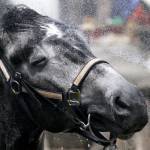Older Horses and Heat Stress

A study conducted at Rutgers University found that older horses have a more difficult time than their younger counterparts when dealing with exercise in hot weather.
According to the study, a senior horse typically doesn’t have as much plasma volume in its blood, and therefore has a smaller amount of fluid in reserve for sweating. Since sweating is an important way for horses to lose body heat, the older horse will tend to overheat more quickly while exercising in hot, humid conditions. During the study, researchers exercised young and older horses at the same intensity, causing the horses to generate similar amounts of body heat from muscular exertion. They found that the older horses reached a specified level of heating in only half the time required for younger horses to generate the same amount of heat, showing that the younger horses were much more efficient at staying cool. However, when exercise ceased, both sets of horses cooled down at similar rates, reaching the same point within ten minutes post-exercise.
Researchers pointed out that many horses are obedient and willing to attempt what the rider asks of them, even if they are becoming uncomfortably overheated, so it is up to the rider to regulate exercise to keep the horse from becoming too hot. This can be achieved by taking more frequent breaks during exercise periods, making sure the horse is conditioned for the work expected of him, refraining from working at all in very hot and humid conditions, and lowering expectations and demands for senior horses. Riders also need to be aware of signs of discomfort or overheating such as the horse slowing down, breathing harder than normal, showing an increased heart rate, sweating profusely, or becoming cranky or unwilling. The study found that the decrease in ability to handle heat developed as a horse reached its late teens or early 20s.








